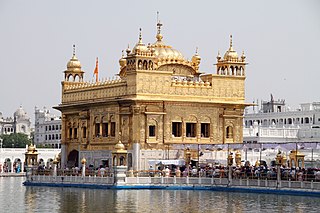
Sikhism, also known as Sikhi, is an Indian religion and philosophy in particular for the Sikh ethnoreligious group that originated in the Punjab region of India around the end of the 15th century CE. The Sikh scriptures are written in the Gurumukhi script particular to Sikhs. It is one of the most recently founded major religious groups and among the largest in the world, with about 25–30 million adherents.
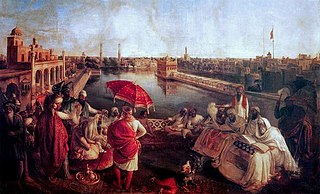
Sikhs are an ethnoreligious group and Indo-European people who adhere to Sikhism, a religion that originated in the late 15th century in the Punjab region of the Indian subcontinent, based on the revelation of Guru Nanak. The term Sikh has its origin in the Sanskrit word śiṣya, meaning 'seeker', 'disciple' or 'student'. According to Article I of Chapter 1 of the Sikh Rehat Maryada, the definition of Sikh is: Any human being who faithfully believes in
- One Immortal Being
- Ten Gurus, from Guru Nanak Sahib to Guru Gobind Singh Sahib
- The Guru Granth Sahib
- The utterances and teachings of the ten Gurus and
- The initiation, known as the Amrit Sanchar, bequeathed by the tenth Guru and who does not owe allegiance to any other religion, is a Sikh.
The following outline is provides an overview of Sikhism, or Sikhi.

Smethwick Rangers Football Club is a football club based in Smethwick, West Midlands, England. They are members of the Midland League Division One and play at the Trevor Brown Memorial Ground in Boldmere, groundsharing with Boldmere St Michaels.

Gurdwara Sri Guru Singh Sabha Southall (SGSS) is a Sikh gurdwara situated on Guru Nanak Road and Park Avenue, Southall, in the London Borough of Ealing. It is the largest Sikh temple in London. Building work at the Havelock Road site commenced in March 2000 and the gurdwara opened on Sunday 30 March 2003, in order to accommodate Southall's growing Sikh community. The gurdwara cost £17.5 million to build. It was funded by donations from members of the local Sikh community.
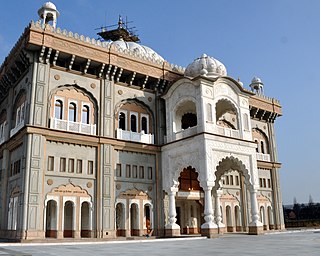
British Sikhs number over 520,000 people and account for 0.85% of the British population as of 2021, forming the United Kingdom's fourth-largest religious group. According to the 2021 United Kingdom census, British Sikhs numbered 524,529, with 520,092 in England, 4,048 in Wales, and 389 in Northern Ireland. The largest Sikh populations in the United Kingdom are in the West Midlands and Greater London.

German Sikhs are a growing religious minority in Germany. The majority of German Sikhs have their roots from the Punjab, India with the remaining coming from the Afghan Sikh community or through conversion. The number of Sikhs is estimated to be between 25,000. Germany had the fifth highest Sikh population in Europe after United Kingdom (524,000), Italy (220,000), Portugal (35,000) and Spain (26,000).

English Sikhs number over 520,000 people and account for 0.9% of England's population in 2021, forming the country's fourth-largest religious group. In 2006 there were 352 gurdwaras in England. The largest Sikh populations in the U.K. are in the West Midlands and Greater London.

Sikhism in Scotland includes all aspects of Sikh life and Sikhism in Scotland. Sikhs have been present in Scotland for over a century, with the first documented Sikh, Maharaja Daleep Singh, arriving in Perthshire in 1855. The next wave of migration was in early-to-mid 1920s when prominent Sikhs of the Bhat/Bhatra community established themselves in Glasgow and Edinburgh. However, the bulk of Sikhs in Scotland come from families who immigrated during the late 20th century. In Scotland Sikhs represent 0.2% of the population (9,055).

Thathi Bhai is a village in Tehsil Bagha Purana, District Moga in Punjab, India.

Pearls Kabaddi World Cup 2010 was the first international circle style kabaddi world cup and was held in Punjab, India.
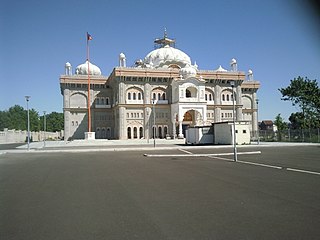
The Guru Nanak Temple is a Sikh Gurdwara situated in the town of Gravesend, Kent. It is the largest Gurdwara in Europe and also one of the largest outside India.

Pearls Kabaddi World Cup 2011 was the second edition of the circle style Kabaddi World Cup played in Punjab, India and overall fourth Kabaddi World Cup. It was played in various cities of the province from 1 to 20 November 2011 with teams from 14 countries.
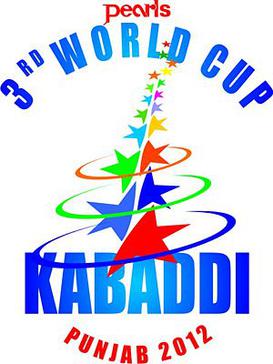
2012 Kabaddi World Cup was the third edition of the circle style Kabaddi World Cup, organised by the Government of Punjab. It was played in Punjab, India in various cities of the province from 1 to 15 December 2012 with teams from 16 countries. The opening ceremony of the tournament was held in Bathinda and the closing ceremony in Ludhiana.

Sikhism prohibits idolatry, in accordance with mainstream Khalsa norms and the teachings of the Sikh Gurus, a position that has been accepted as orthodox.
The 2013 World Kabaddi Cup was the fourth edition of the circle style World Kabaddi Cup, held from 1 to 14 December 2013 with the Opening Ceremony on 30 November 2013 at Bathinda. The tournament took place in Punjab, India.
The 2014 World Kabaddi Cup was the fifth edition of the circle style World Kabaddi Cup, held from 7 December to 20 December 2014 with the opening ceremony on 6 December 2014 at the Guru Gobind Singh Stadium in Jalandhar. The tournament took place in Punjab, India.

Punjabi kabaddi, also called circle style kabaddi, is a contact sport that originated in the Punjab region, in the northern part of the Indian subcontinent. There are a number of traditional Punjabi kabaddi styles traditionally played in the Punjab region. As standard kabaddi, circle style kabaddi is also played at state and international levels, through various governing bodies such as Kabaddi World Cup.
Sandeep Singh Sandhu also popularly known as Sandeep Nangal Ambian was a British-Indian kabaddi player who played in the position of a stopper. He had represented both India and the United Kingdom in international kabaddi matches. He also captained both India and UK kabaddi teams. He settled in West Brom, UK in around 2007. Sandeep was also well known for his efforts to eradicate drug menace and the issue of drug intake among youth through sports.













